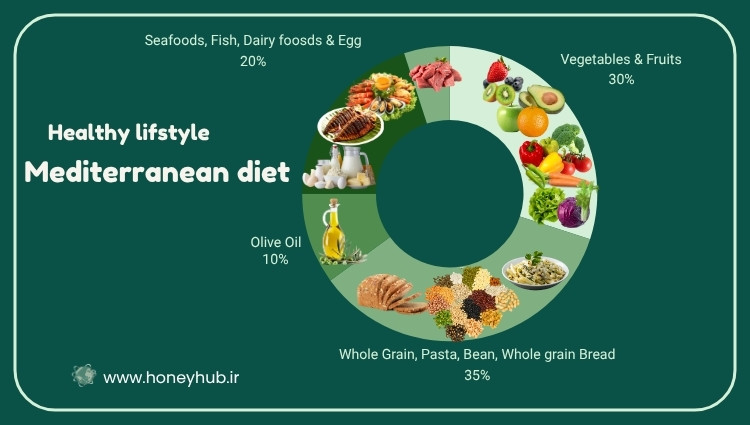Does your mozzarella refuse to stretch or just burn? The secret is science. From "pasta filata" to the crucial role...
The Mediterranean Diet: Your Ultimate Guide to Delicious Eating, Lasting Health & Vitality
The Mediterranean Diet: Your Gateway to Lasting Health and Vitality
Have you ever heard of the Mediterranean diet but aren't exactly sure what it is or how it can transform your life? Don't worry! This post is your comprehensive guide to understanding this amazing diet from A to Z and implementing it easily into your life. Our goal is to answer all your questions so you won't need to search other sites. The Mediterranean diet isn't just a temporary weight loss plan; it's a sustainable lifestyle rooted in the culinary traditions of Mediterranean countries like Greece, Italy, and Spain. This diet has gained worldwide fame for its countless health benefits, including improved heart health, weight loss, and increased longevity. Let's embark on a journey together into the colorful and healthy world of the Mediterranean.
What is the Mediterranean Diet? Understanding Its Philosophy
Unlike many diets that focus on calorie counting or completely eliminating specific food groups, the Mediterranean diet emphasizes consuming whole, natural, and unprocessed foods. Imagine sitting on a sunny Greek shore, enjoying a plate full of fresh vegetables, juicy olives, and grilled fish. This picture is the essence of the Mediterranean diet. This diet follows a food pattern traditionally observed in regions of the world where people have longer lifespans and lower rates of chronic diseases. The philosophy of this diet is based on enjoying food, regular physical activity, and social interactions; meaning, it doesn't just nourish your body, but also feeds your soul.
Foods in the Mediterranean Diet: What to Eat and What to Avoid?
To start this journey, let's see which foods are central to the Mediterranean diet and which ones we should steer clear of:
A Bounty from Nature: What You Should Eat
Imagine having a colorful spread of nature's freshness every day. Fruits and vegetables reign supreme in this diet; crisp apples, sweet bananas, juicy tomatoes, fresh lettuce, and any other seasonal fruit or vegetable available to you should make up a large part of your diet. These are packed with vitamins, fiber, and antioxidants that act like little soldiers protecting your body. Whole grains like whole-wheat bread, whole-wheat pasta, brown rice, oats, and quinoa also provide the main fuel for your body and give you sustained energy. Legumes such as lentils, chickpeas, and various beans are the unsung heroes of this diet, providing you with ample protein and fiber. Don't forget that nuts and seeds (like almonds, walnuts, sunflower seeds, and chia seeds) are also fantastic sources of healthy fats and protein, though be mindful not to overindulge as they are calorie-dense.
But the undisputed star of this diet is extra virgin olive oil. This liquid gold not only adds an incredible flavor to your dishes but is also rich in healthy monounsaturated fats that work wonders for your heart health. You can use it for cooking, drizzling on salads, or even for dipping bread. Fish and seafood, especially Omega-3 rich varieties like salmon, sardines, and mackerel, should feature on your plate at least twice a week. They act as a protector for your heart and brain. Lastly, to flavor your food instead of using too much salt, use fresh herbs and spices, and don't forget water, water, and more water; it's the best drink for your body.
Moderate Consumption: The Line Between Enjoyment and Excess
Poultry and eggs can be consumed a few times a week in moderation. Also, dairy products like natural yogurt and low-fat cheeses, especially fermented types like yogurt and kefir, have their place in this diet.
Serious Dos and Don'ts: What to Avoid?
Just as we plan for our health, we must avoid certain things. Red meat should be consumed rarely and in very small amounts (e.g., a few times a month). Save sweets and desserts containing added sugar only for special occasions and in very small quantities. Sugary drinks should be eliminated entirely. Stay away from processed foods and fast foods; these are full of salt, sugar, and unhealthy fats and harm your body. Also, avoid processed vegetable oils like corn, soy, and sunflower oil, as they don't have a proper ratio of Omega-3 to Omega-6 fatty acids.

Why the Mediterranean Diet? Unparalleled Health Benefits
Following the Mediterranean diet can have amazing effects on your health. This diet is not only an effective way to lose weight but also helps prevent and control many chronic diseases. Imagine that with every bite you take, you're contributing to the health of your heart, brain, and entire body:
Numerous studies have shown that this diet significantly reduces the risk of heart disease, stroke, and high blood pressure. The healthy fats in olive oil and Omega-3s in fish act like a protective shield for your heart. By emphasizing whole, fiber-rich foods, this diet helps you feel fuller for longer, gradually lose weight, and maintain it; so you no longer have to worry about regaining weight. Also, this diet can help improve insulin sensitivity and better control blood sugar levels, which is very important for preventing and managing type 2 diabetes. The nutrients and antioxidants in this diet help protect brain cells and reduce the risk of dementia and Alzheimer's disease. This means it's literally food for your brain! Many foods in the Mediterranean diet have anti-inflammatory properties that help reduce chronic inflammation in the body, which is the root of many chronic diseases. Finally, multiple studies have shown that people who follow this diet live longer and experience a better quality of life in old age. It can even help improve mood and reduce the risk of depression because the link between diet and mental health has been proven.
Beyond Food: The Mediterranean Lifestyle
The Mediterranean diet isn't just about eating; it's about a complete lifestyle. Imagine being active every day, eating your meals calmly with those you love, and giving yourself time to rest and enjoy life. Regular physical activity, whether it's a daily walk in the park, gardening in your yard, swimming in a pool, or any favorite sport that keeps you active, is an essential part of this lifestyle. Enjoying meals peacefully, with family and friends, and engaging in conversation is highly important. This not only aids better digestion but also makes you enjoy the present moment more. Relaxation, stress reduction, and getting enough sleep are also vital for overall body health; these are supplements that make your diet work best.
How to Start the Mediterranean Diet: Step by Step
To begin this journey towards health, there's no need for sudden, shocking changes. You can start gradually and with small steps, just like a gentle stroll along a Mediterranean beach:
The first step is to incorporate more vegetables and fruits. Try to dedicate half of your plate at each meal to these rich sources of vitamins and fiber. Change your snacks to fresh fruits and vegetables as well. Then, replace white bread with whole-wheat bread and grains. Sangak or barley bread, brown rice, or quinoa are excellent choices that give you sustained energy. And the main hero: switch to olive oil! Use extra virgin olive oil as your primary source of fat for cooking and salads. The next step is to increase fish consumption. Eat fish at least twice a week; even canned tuna or sardines are good options. Alongside these, reduce red meat consumption and use poultry, fish, or legumes as your protein source instead. Don't forget: water, water, water! Your primary beverage should be water, not sugary drinks. Also, add nuts and seeds to your diet; they are healthy and nutritious snacks. And most importantly, eat slowly and enjoy your food; this helps you feel fuller and eat less.
Sample One-Day Mediterranean-Style Meal Plan
To better imagine what a Mediterranean day looks like, let's review a sample meal plan together:
Breakfast: You can have a bowl of Greek yogurt with fresh strawberries and a little honey, or a slice of whole-wheat bread with an egg and fresh vegetables. Mid-morning snack: A crisp apple with a few almonds, or chopped carrots with hummus dip, which is both filling and nutritious. Lunch: A large, colorful salad with lettuce, tomato, cucumber, olives, feta cheese, chickpeas, and a simple dressing of olive oil and lemon juice, accompanied by a slice of whole-wheat bread. Afternoon snack: A few walnuts and another seasonal fruit. And for dinner: A piece of grilled salmon with steamed vegetables (like broccoli and asparagus) and a little brown rice, or a bowl of lentil stew packed with fresh vegetables.
A Few Important Tips for Success on the Mediterranean Diet:
To make this lifestyle enjoyable and sustainable for you, remember a few tips. First, shop smart; when shopping, focus on fresh, seasonal, and unprocessed foods, just as if you were shopping at a local Mediterranean market. Second, prepare your meals at home as much as possible to have more control over the ingredients and get rid of harmful additives. Third, don't forget variety; try to use different types of fruits, vegetables, and whole grains to benefit from all nutrients and never get bored. And finally, be patient; changing your lifestyle takes time. Give yourself time and enjoy this journey, moving step by step towards health and vitality.
Is the Mediterranean Diet Suitable for Everyone?
In general, the Mediterranean diet is suitable and safe for most healthy individuals and offers many benefits. However, if you have a specific medical condition (such as diabetes, kidney disease, or cardiovascular disease) or are pregnant, it is always recommended to consult with your doctor or a nutritionist before starting any new diet. Your health is the top priority.
Differences from Other Diets (e.g., the Ketogenic Diet)
You might have heard that other diets like the ketogenic diet are also effective for weight loss. But there are fundamental differences between these two diets. While the ketogenic diet focuses on very low carbohydrate intake and high amounts of fat to push the body into a state of ketosis, the Mediterranean diet is a more balanced regimen that emphasizes complex carbohydrates from whole grains, healthy fats, and plant-based and animal proteins. Both diets can be beneficial for weight loss, but their approach and philosophy are quite different. The Mediterranean diet focuses more on sustainability and a long-term healthy lifestyle, while keto is often designed for short-term goals or specific therapeutic purposes. Choosing the best diet depends on your health goals, lifestyle, and personal preferences.
Conclusion: Health is Within Your Reach
The Mediterranean diet is more than just a meal plan; it's a comprehensive guide to a healthy and vibrant life. By focusing on whole foods, physical activity, and enjoying life, this diet helps you become the best version of yourself. Start and enjoy its countless benefits for your health and vitality. Remember that health is your greatest wealth, and your food choices play a significant role in it. With this comprehensive guide, you can easily begin your journey towards a healthier and more energetic life. Are you ready to taste the Mediterranean life?
Further Resources for Designing Your Mediterranean Diet:
For more information and detailed guidelines, you can refer to the following credible sources recommended by global nutrition and health experts:
- Mayo Clinic - Mediterranean Diet: A comprehensive and authoritative guide from one of the world's top medical centers.
- American Heart Association - Mediterranean Diet: Useful information from the American Heart Association, focusing on heart and vascular health.
- NHS (UK) - The Mediterranean Diet: Practical and applicable guidance from the UK's National Health Service.
What is the Mediterranean diet?
It's a healthy eating pattern inspired by the traditional cuisines of countries bordering the Mediterranean Sea, emphasizing whole foods like fruits, vegetables, whole grains, legumes, nuts, seeds, and olive oil.
What are the main foods to eat on Mediterranean diet?
Focus on fruits, vegetables, whole grains, legumes, nuts, seeds, fish, seafood, and extra virgin olive oil. Poultry, eggs, and dairy can be eaten in moderation.
What are the main health benefits?
Benefits include improved heart health, weight management, reduced risk of type 2 diabetes, better brain function, and increased longevity.
Is the Mediterranean diet suitable for everyone?
Generally yes, but individuals with specific medical conditions or dietary needs should consult a doctor or nutritionist before starting.
Leave a comment
Log in to post comments
Related posts
 Why does pollen improve your health?
Why does pollen improve your health? Honeycomb honey, a special product with multiple health benefits
Honeycomb honey, a special product with multiple health benefits



















Latest comments